There’s something about a cultural moment in theatre that has its pros and cons. The pros are the excitement and wonder at our artform's getting attention. The cons are the work never being able to match the hype around it.
Revisiting Hamilton, it's safe to say that it still lives up to the hype of a decade ago.
However, revisiting a cultural phenomenon is interesting, especially one that is so ingrained in cultural consciousness. The Hamilton pro-shoot did amazing things for democratising access to what was once the hottest ticket on Broadway. But it also canonised those performances more than usual. So, where do you go from there?
You go where the current tour cast go and make it your own, and in the process, give it a real heart that is in keeping with the original but also wholly different and their own. In bold statements, it is a better, newer Hamilton than perhaps we’ve seen in a while. Because what happens with Broadway musicals is what Michael Reidel famously called the ‘Xerox musical’, which is the attempt to reproduce the original exactly; firstly, you can’t. Secondly, with a show like Hamilton, when it was written for that original cast and starring its creator…you could never replicate it. And some casts, it feels like, have fallen short of that. But not this tour cast; every character feels like they are being made by the actor, not replicating something gone before.
Shaq Taylor gives us a soft-spoken, vulnerable Alexander Hamilton. He takes Hamilton from a slightly bumbling young man to a self-assured man of government through a series of imperceptible shifts. But by the end, you are watching instead of a misplaced set of declarations not matched by the body language or speech, to a cool, confident man who has grown into his previous self-belief. Rather than playing Hamilton as arrogant, he plays the quiet desperation to better himself that drives him, and it’s a blindingly good emotional choice. Opposite him is the self-assured nature of Aaron Burr, played by Sam Oladeinde gives a beautiful contrast between the men- Burr starts off more confident than Hamilton, but they ebb and flow together; we feel Burr’s defeats at the hands of Hamilton; and his rising to counter them. His ‘Wait for It’ is achingly beautiful and resonates with his endless fight and desperation to, like Hamilton, better himself in the face of endless obstacles. Again, the vulnerability he allows the character to show truly brings home the emotional weight on both men that drives the story.
Hamilton’s group of friends (and foes) are believable young men, and this group really plays the friendship of the group, with the relationship between them coming through strongly. DeAngelo Jones plays the quiet earnestness of John Laurens well before switching to the assuredness of Phillip Hamilton. The camp fabulousness of Thomas Jefferson is brought home by Billy Nevers who clearly revels in what is one of the most fun to watch, as well as probably play, roles in Hamilton. However, is there anyone in that group of friends who has more fun than the actor playing Hercules Mulligan? KM Drew Boateng seems to demonstrate not, embracing the effervescent fun that is Mulligan in particular. The Hamilton ‘crew’ seem genuinely friends, and the camaraderie and bond they play make the emotional moments of their story pack even more of a punch. Charles Simmons also lends emotional weight as George Washington. He plays the role with quiet calm and a distinct lack of bluster or posturing…he plays the man Washington rather than the politician, and it’s quietly affecting.
The most important thing to always note in Hamilton is the work the ensemble does. The chorography is criminally overlooked in praise for the original, with the dance storytelling doing so much of the work. And here is no different. The chorography feels fresh, polished, and tight, and the ensemble works with an unmatched awareness of dance storytelling and musicality.
The real strength of this production is that each actor plays the person rather than the politician. Also, it’s been long enough since the original cast, and this company seems to feel really at home giving the part their own twist. It’s always more daunting for earlier casts, who perhaps feel they have to replicate the often iconic originals. But here, there's a real sense of the company making it their Hamilton and the show is all the stronger for it.
Speaking of the original cast and building on something iconic, it’s worth reflecting on how we look at Hamilton now that we’re a decade and a bit from the original. The dust has settled on a generational musical and generational talent in Lin Manuel. We recognise it is genius, genre-defining stuff…but how does the intervening decade impact how we read it?
The thing with writing history (and I often use Hamilton when teaching people about writing history) is that history rarely obeys the three-act structure well. And now, with some distance from the cultural moment that was Hamilton, we can say that elements of the story could (should) have been edited for story and structure. The pacing is a bit uneven in the story- for example, the dramatic climax, which is the end of the war, is forced from its natural place at the end of Act 1 because there is simply too much Hamilton to fit in. Why do you write like you’re running out of time, or perhaps write like there’s infinite stage time? Similarly, Act 2 sometimes suffers from pacing issues; however fascinating you find politics, it lacks the urgency of a war. Dramatically speaking, it’s the inverse of what you’d want- you’d want politics first and victorious war second, substantially. So now that we have all long acknowledged Hamilton’s genius, it’s fair to recognise the slight flaws or more pitfalls that come with…writing history. But, and if those who are reeling in the audacity to criticise Hamilton are still reading, it’s in here that the genius of the writing pulls it through and indeed makes it…one of the best-crafted musicals in recent decades.
While the dramaturgy could have used a more critical friend, the songwriting and musical craftsmanship are unmatched. Again, I teach Hamilton regularly, so forgive the nerdy deeper dive for a review, but the strength of Hamilton (and Lin Manuel Miranda’s writing in general) is the deep, nerdy knowledge of musicals that underpins it. Hamilton breaks the rules because its writer knows them so well….and,if you look closely, it doesn’t break the rules; it plays by them so closely with a little twist. In terms of musical structure, it hits every mark of a classic (if sung-through) musical; that’s why, despite Hamilton (the man) not playing by dramaturgical rules in life, Hamilton (musical) still works brilliantly. It knows what it needs to do, what beats (literal and rap battle) to hit at the exact moment it needs to hit them, and it does. Emotionally it knows when to ebb, flow, and hit. Entertainment-wise (because we are a musical, after all) it knows when that big number is needed. In short, it is an expertly crafted, put-together end product. In an entirely non-technical way it’s those moments that when you hear that music swell and come together, or the perfect segue between songs makes you want to punch the air with excitement.
But that’s not what I wanted to talk about in the music of Hamilton; I think at this point, we can all agree that it’s an impeccably crafted work of musical theatre, albeit one hampered by its real-life roots. No, what, in revisiting Hamilton, that is so striking is the finesse of the music. It exists very much in its world musically- so fully, and in a way few musicals, particularly modern musicals, do- but also, again, it knows what it is; it’s using the shoulders of what it stands on and crafting something new. But to get super nerdy for a moment, just listen to the transitions between numbers, the way there are musical ‘trails’ between them that fade out then swell to something else but retain a ghost of the musical number that came before. That is where Lin-Manual Miranda excels. Also, where he excels is again; he knows the beast he’s working with. Hamilton was hailed as musically ‘something brand new’ it’s not; that isn’t a criticism; it’s so genius because it’s so so embedded in musical theatre; that’s what the musical nerd did; he took the roots of Sondheim and Larson (there’s no Miranda without Larson I wrote a whole book chapter on that). It’s layered with influences from popular music that Miranda loved (again, not a new idea; his key influence was Jonathan Larson in Rent doing the same, but there have been others). But he does it with a level of musical theatre knowledge and command of music that is currently unmatched by other composers. The true test of musicals that fuse contemporary popular influence is their enduring appeal beyond the moment they are made…and Hamilton now passes that test. It sounds like Hamilton, not that musical that was made in the mid-2000s based on rap music, and that’s the marker of a quality piece of writing.
One final note on revisiting Hamilton echoes that and does,in a way, date it as a musical or piece of art that is separate from the world it’s created in, and Hamilton is no different. Hamilton is an Obama-era music. Heck, Obama himself was a fanboy of the musical and went multiple times. But it is a product firmly of that political era in America. And given that it's a matter of American politics, the two are inseparable anyway. If Hamilton had been made today, it would have been very different in tone and in its approach to America and American politics. Which makes the sheer…hope Hamilton, in a way harder to watch today. Even for those of us who are not Americans, that era of hope feels a long way away. That era of change (for the better, rather than…whatever we have now) feels a long way away. That’s how musicals change with the world we live in. That’s why Hamilton feels nostalgic now…it reminds us of a more hopeful, exciting time when things felt like they could change. The American promise that Hamilton speaks about felt very different when the show was frist made. And that’s an uncomfortable truth to sit with watching the show in 2024.
But we can take from it two things; hope for change in theatre, and eventual hope for our future and the belief in building something good as Hamilton did. The feeling of excitement that Hamilton as a musical created also feels a long way away, given the current offerings in a post-covid Braodway and cash-strapped industry. However, we’re reminded that something that truly alters the course of musicals, as Hamilton did, happens about once a decade. In revisiting Hamilton, I was reminded of how exciting that moment was in musical theatre. There’s a sense of ‘and what next’ because there is always a ‘next Hamilton’ to be found. And politically, too, we might not be in the most hopeful moments again. But perhaps the ideas that Hamilton brings, of building something to be proud of or people shaping the world based on their beliefs and doing what’s good…maybe, is something to hang onto.
Hamilton runs at Wales Millennium Centre Cardiff until 25th January 2025. Tickets available here.
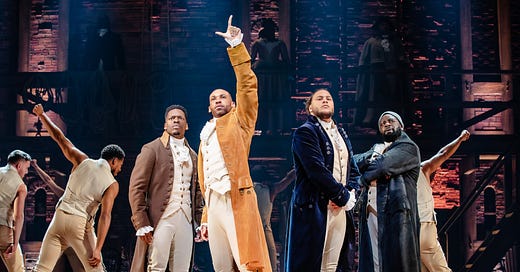



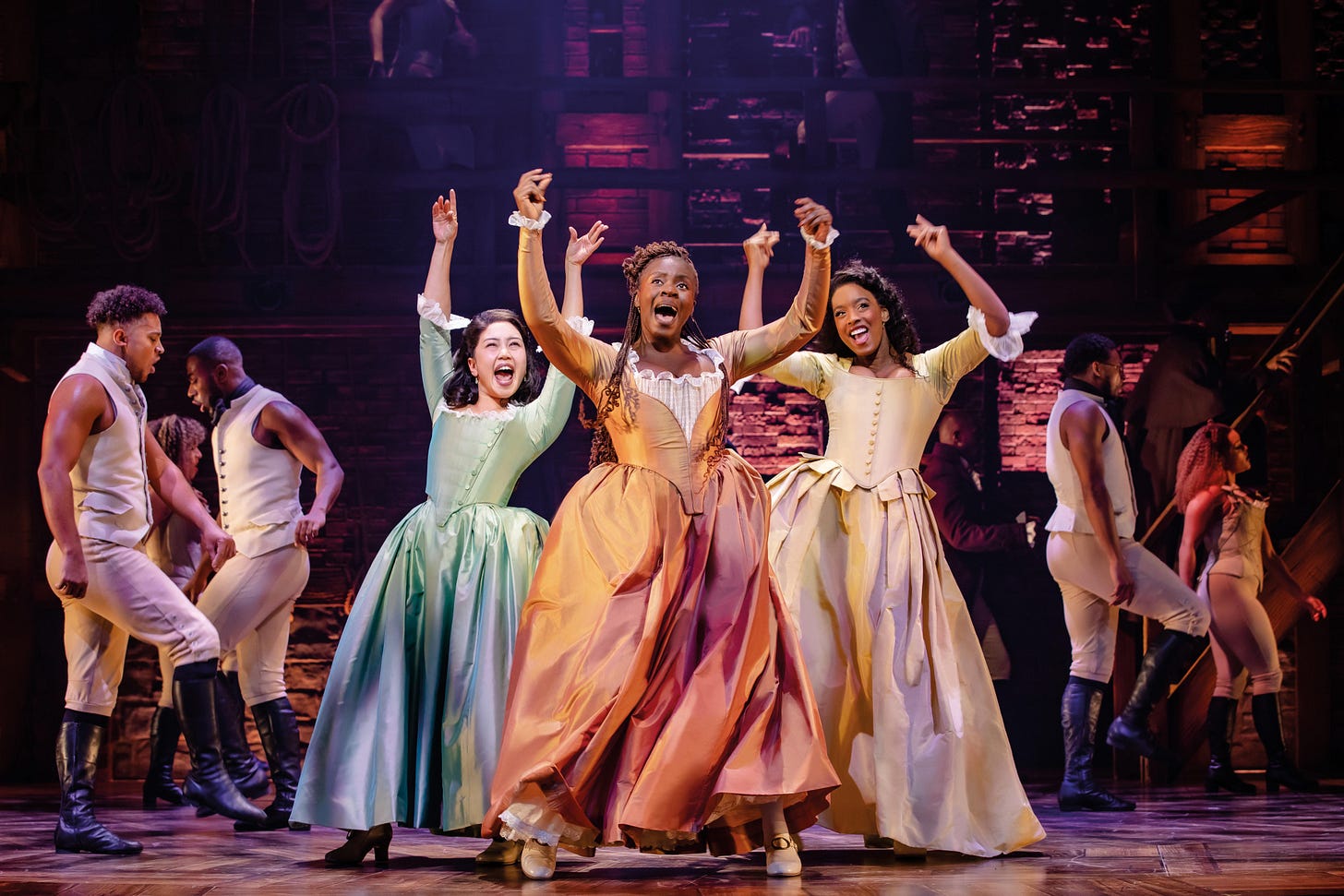
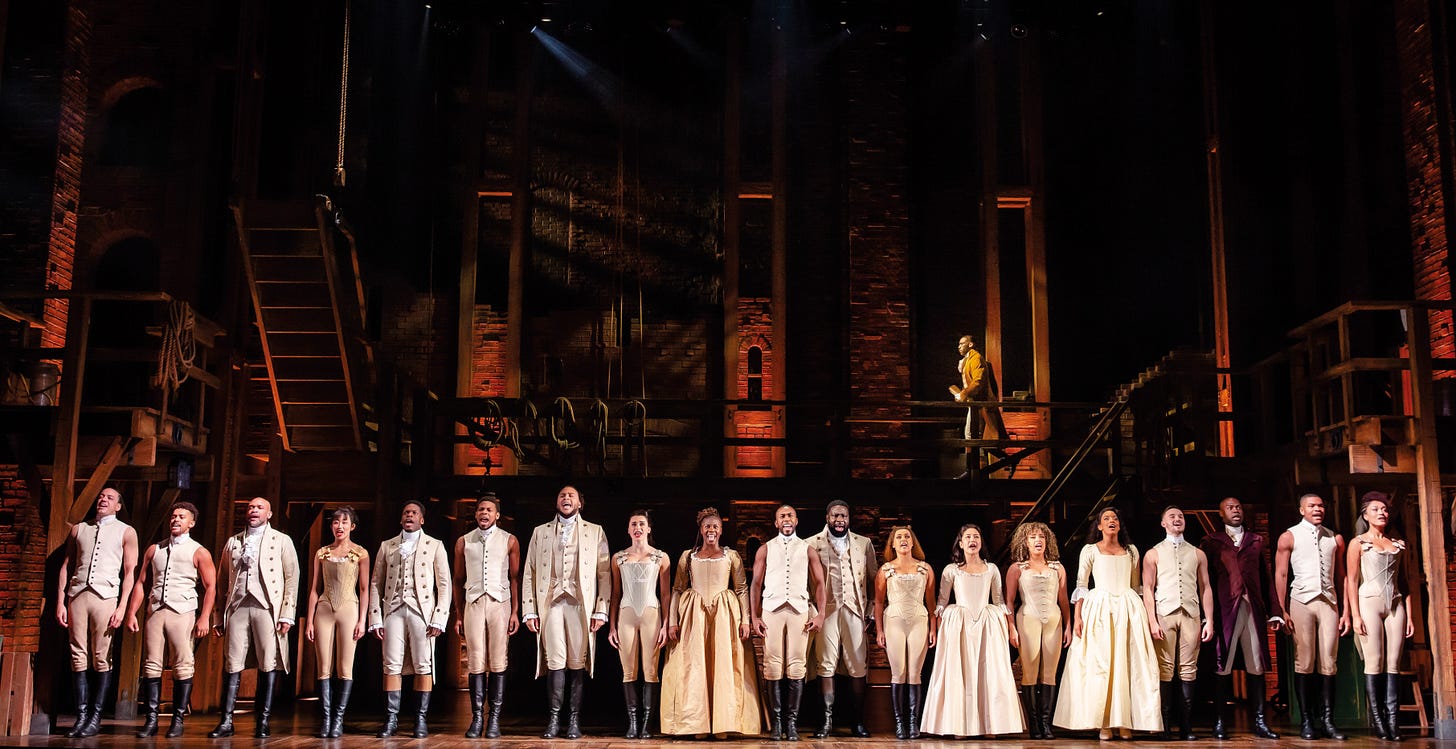
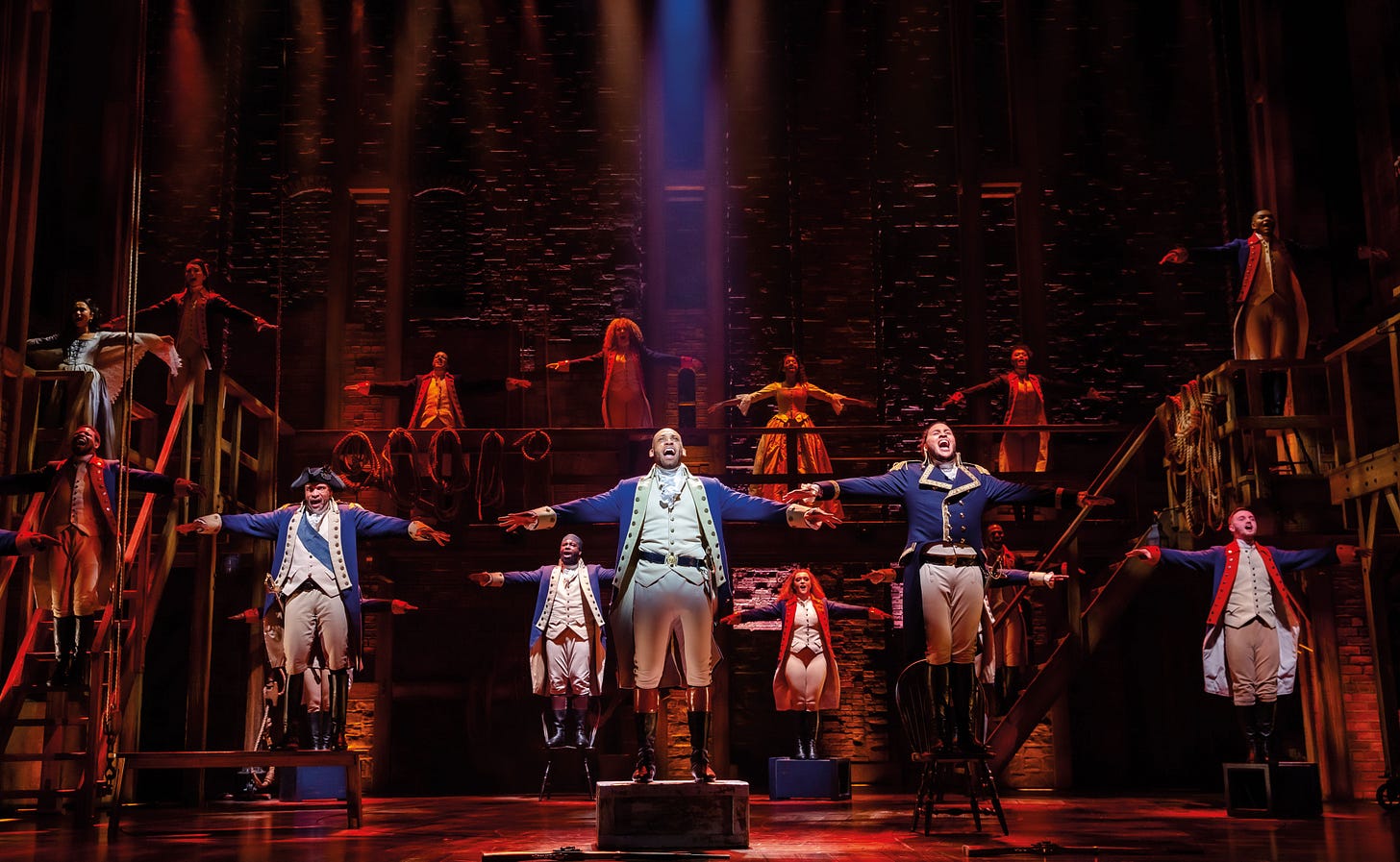
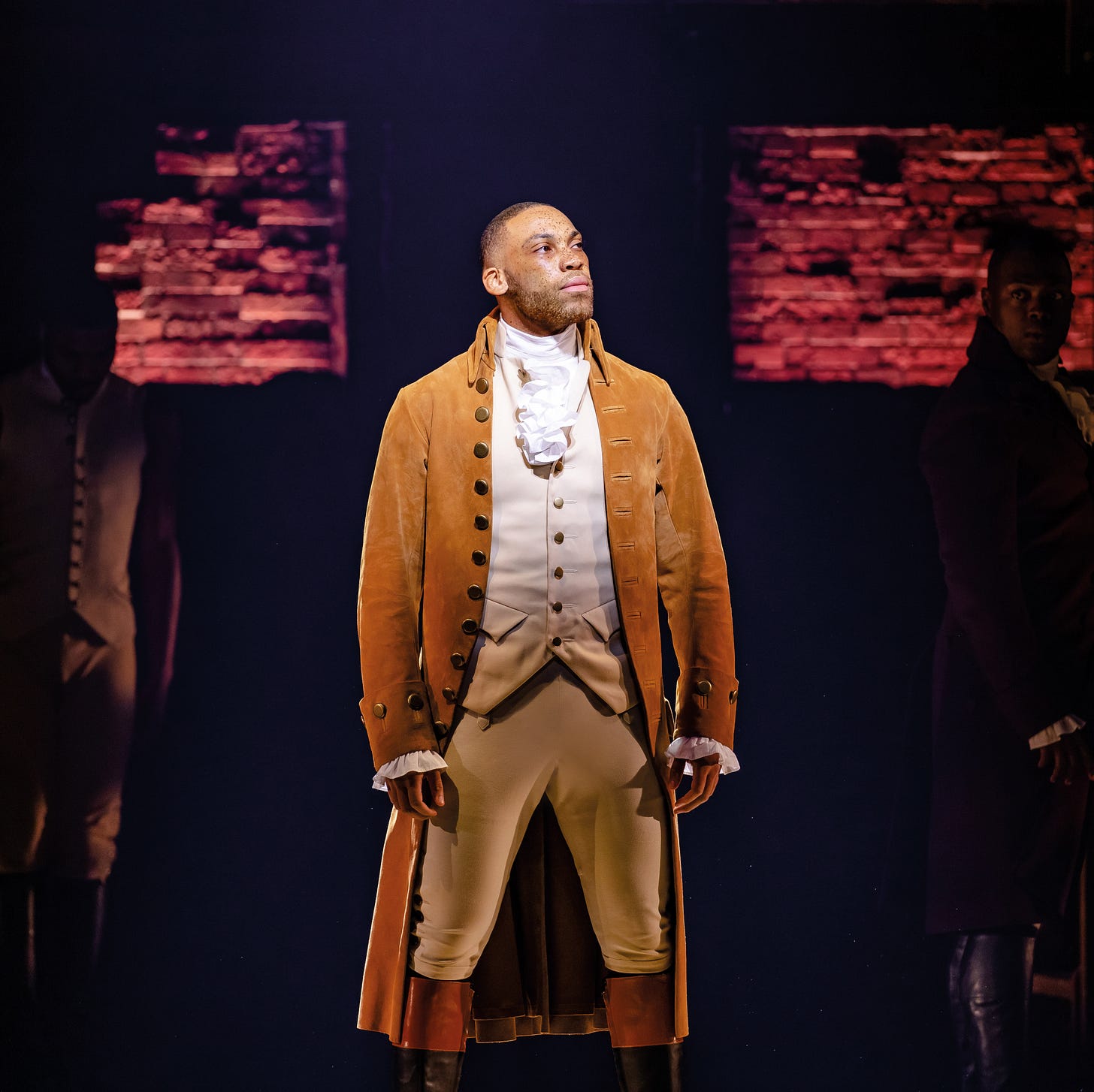
Didn't think I could be more excited for this, but after reading that I really am. Great review!